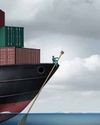Prøve GULL - Gratis
Challenges Confronting Growth In Exim Trade
Maritime Gateway
|February 2018
Inland haulage charges need to be made more equitable and hub and spoke model can bring down rail haulage cost, averred the panellists. They also called for improvement in Customs procedures for cargo clearance, need for more focus on soft infrastructure such as regulatory or statutory regime and developing warehousing and better logistics network for moving agri-produce.
-

The second session of the day focused on the growth of exim trade in north and central India. Tarun Kalra, Vice President North India, MSC Agency (India) Pvt Ltd, observed that the present day maritime trend of port-led development was gradually shifting the export industry to the coastal areas. The export volumes had not developed as much as imports. He however conceded that the shift to the port areas was perhaps necessary for India to remain globally competitive. However due to its demographic concentration imports, had maintained a sustained growth in the hinterland areas.
Kalra asserted that there was a requirement for the Inland Haulage charge to be more equitable to sustain cargo movement to and from the north. A brief calculation of the haulage figures revealed that the comparison of the cost of moving container by rail vis a vis road was slanted in favour of road transport.
He however was of the opinion that very little could be done with regard to reducing the rails haulage charges, but there were other factors that could contribute to reducing the charges. One such measure was to have a hub and spoke arrangement which could significantly contribute towards reduction of haulage costs. This should be available for all the train operators.
Denne historien er fra February 2018-utgaven av Maritime Gateway.
Abonner på Magzter GOLD for å få tilgang til tusenvis av kuraterte premiumhistorier og over 9000 magasiner og aviser.
Allerede abonnent? Logg på
FLERE HISTORIER FRA Maritime Gateway

Maritime Gateway
Impact Of Covid-19 On Shipping And Logistics
Industry stalwarts discuss threadbare the prevailing logistics and supply chain scenario and issues in clearing cargo during the COVID-19 lockdown
15 mins
May 2020

Maritime Gateway
Digital Platforms Defy Lockdown
Digital trading modules such as eNAM are enabling farmers to move their produce from farm to market even during the lockdown
4 mins
May 2020

Maritime Gateway
GARMENT TRADE TRAMPLED
As retailers face a shutdown in US and Europe, the cascading affect has caused mass cancellation of orders in Bangladesh
2 mins
May 2020

Maritime Gateway
TRADE RESUMES WITH CHINA
While India has allowed uninterrupted movement of imports into Nepal even during lockdown, China is reopening its borders as it emerges from the pandemic
2 mins
May 2020
Maritime Gateway
LESS HUMAN INTENSIVE, MORE DATA DRIVEN
AI provides transformational opportunity for logistics industry by improving customer experience, operational efficiency, faster turnaround time and lower cost while ensuring security and transparency. Macro environment requires industry to transform to be less human intensive, agile and data driven, all of which can be accelerated by AI adoption, shares Gangadhar Gude, Founder & CEO, atai.ai
6 mins
May 2020

Maritime Gateway
SHAKEN AND STIRRED
The COVID-19 pandemic has partially paralysed the logistics and supply chain, but the industry is still deterred to ensure supply of essentials continues
9 mins
May 2020

Maritime Gateway
TRADE STUCK, ECONOMY SLOWS DOWN
Sri Lankan economy slows down as trade deficit widens and supply chain disrupts amidst lockdown
2 mins
May 2020

Maritime Gateway
LENDING INTELLIGENCE TO SUPPLY CHAIN
If you’re shipping millions of dollars’ worth of pharmaceuticals, high-end electronics, expensive seafood, or precious metals, what would you be willing to pay for the ability to ‘ask’ your shipment where it is right now and whether it’s ok? What would you pay for a freight smart enough to raise an alarm before it spoils? Artificial Intelligence enables that and much more…
15 mins
May 2020

Maritime Gateway
CONTAINER LINES SIGNAL ‘SOS'
As the per-unit cost of operations increases many lines are forced to blank sailings which has hit their bottom line real hard. The Government and Terminal Operators therefore need to actively consider reduction in Vessel Related Costs
2 mins
May 2020

Maritime Gateway
IMO 2020 And The Covid-19 Curse
The COVID-19 outbreak has shaken and stirred the already volatile bunker market. While the refiners adjust their capacities and shipping lines choose their path to compliance, the market dynamics are yet to reach an equilibrium
12 mins
April 2020
Translate
Change font size

